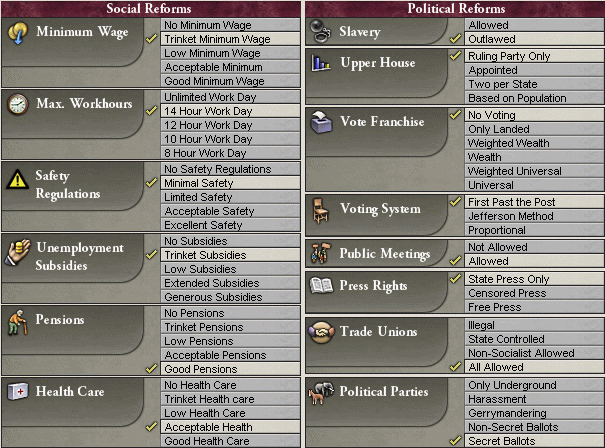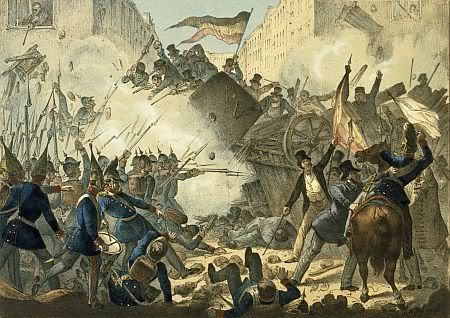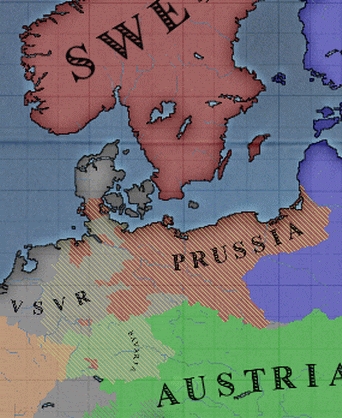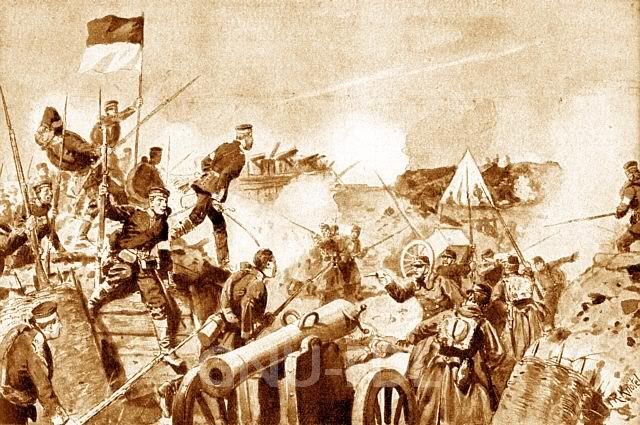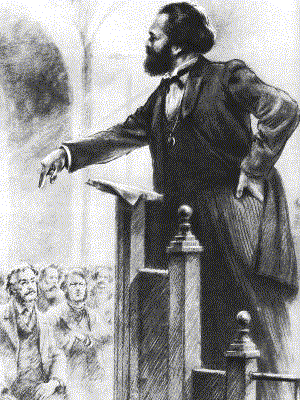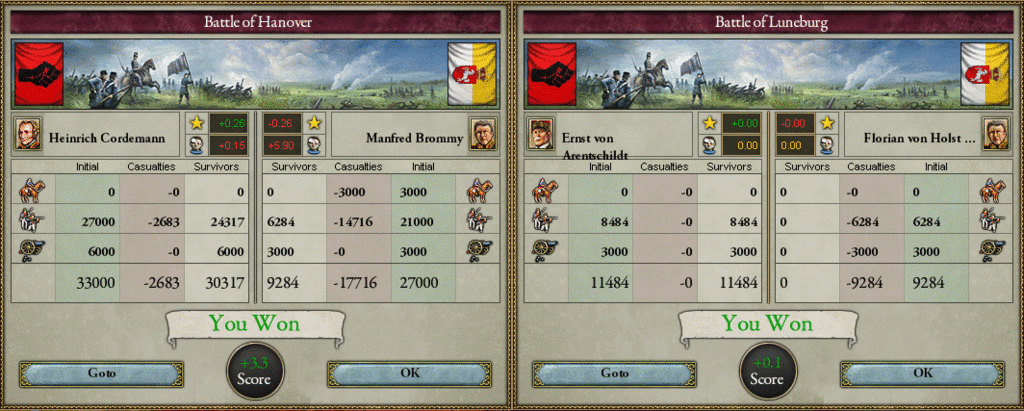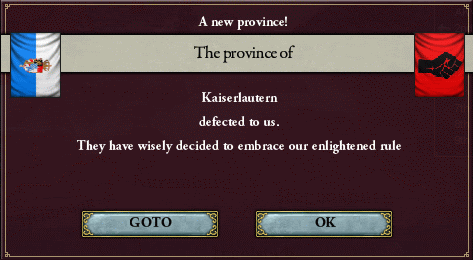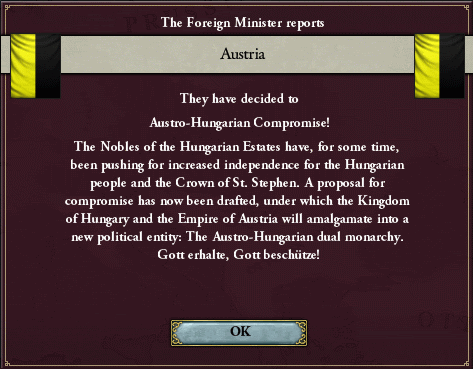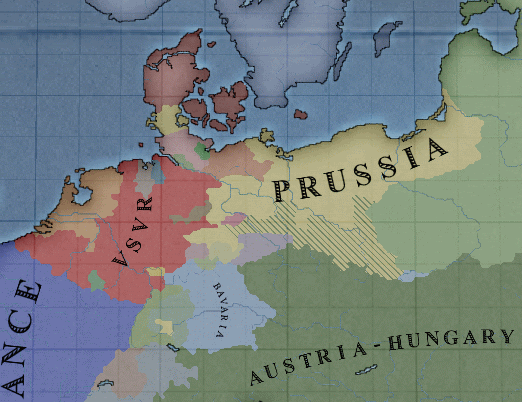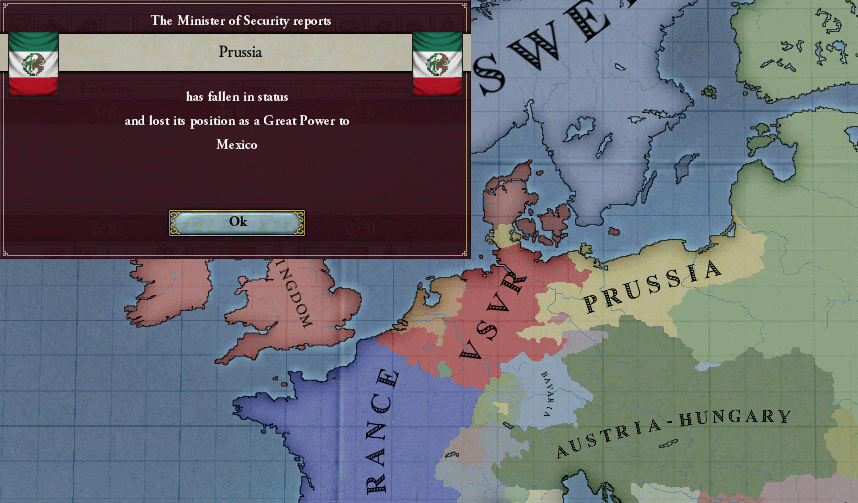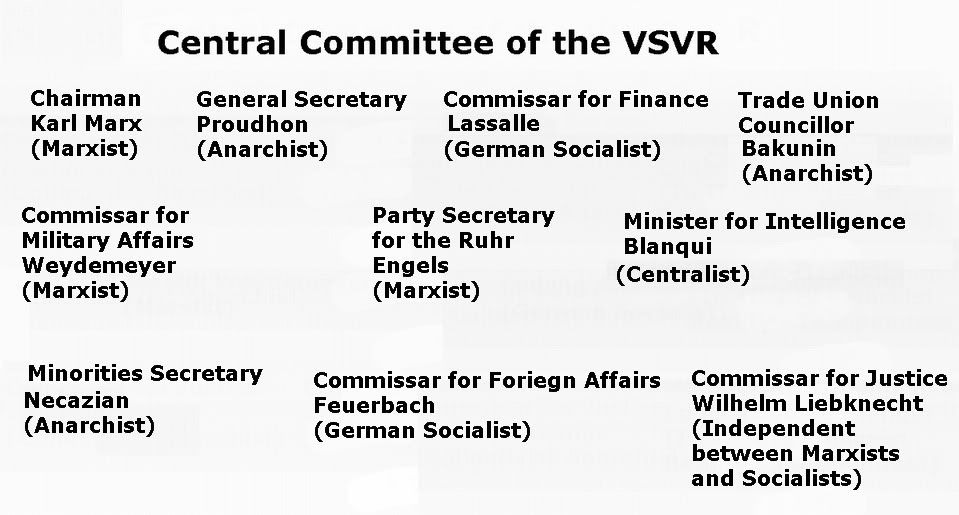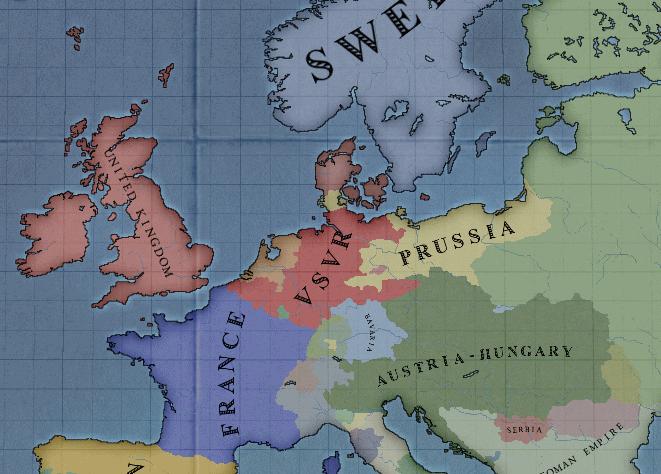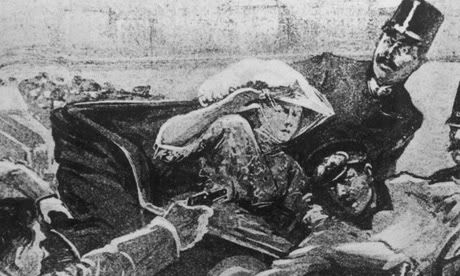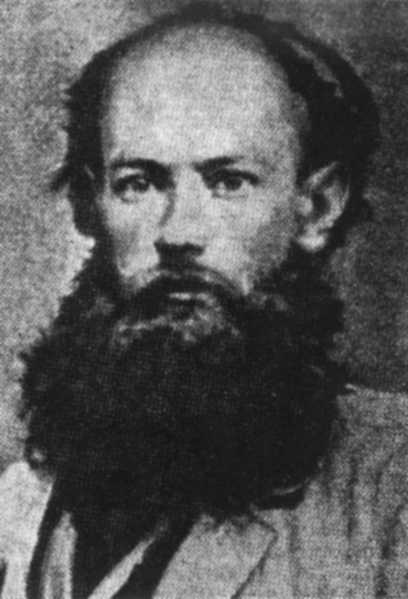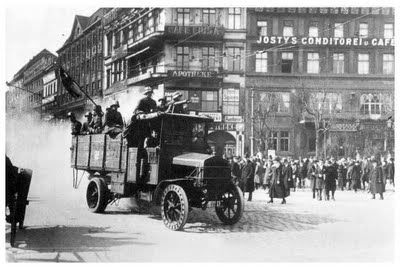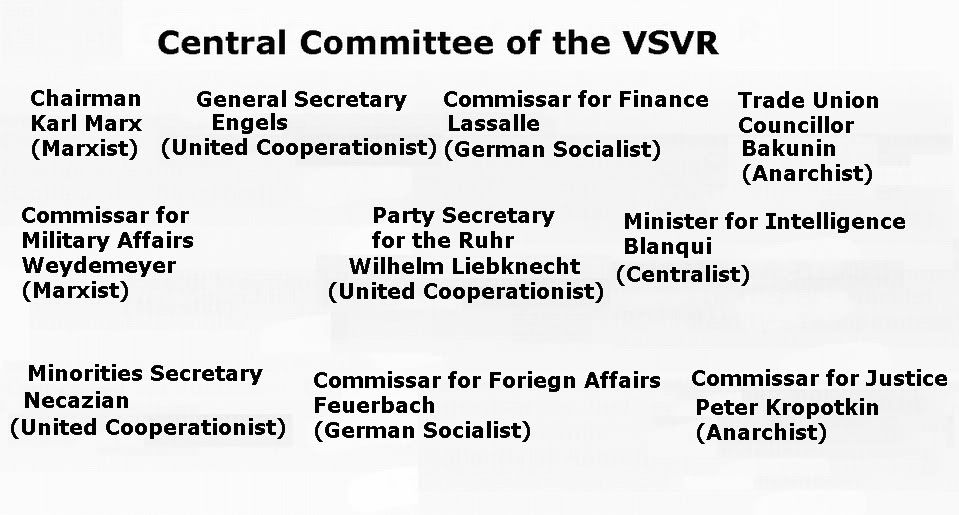The World in Review – 1860
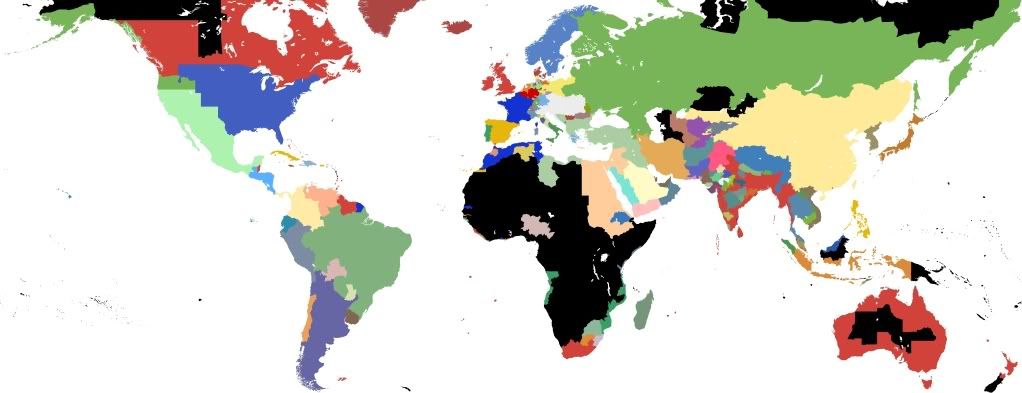
Ten years on from the revolution the world was still dominated by the great Imperialist powers. The traditional Imperial powers have retained their power (for the most part) and many have indeed expanded their influence. Meanwhile in the Americas three new Empires have emerged. In North America the Empire of Mexico recovered from the loss of Texas to the USA and secured victory in a civil war with its own people whilst in South America Brazil and Argentina have expanded their influence through sheer brute force. Whilst the ‘Republic’ of Argentina does not officially have a King the state does not bear the usual hallmarks of a Republic in that it does not have elections.
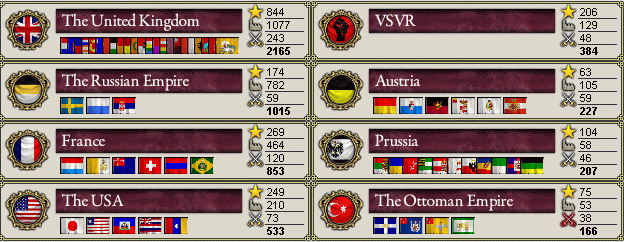
The United Kingdom has remained the undisputed greatest power on earth for 5 decades since Napoleon’s final defeat. Industrially it is unmatchable, its great fleet dwarfs all those of Europe’s other powers combined whilst its influence is felt in every single corner of the globe from New Zealand to Oregon.
Russia was the great success story of the mid 19th century. Under the leaderships of Nicholas I and Alexander II after him the Russian Empire has experienced an incredible wave of industrialisation. A mixture of forced migrations, a lack of land in the countryside and schemes by the state to encourage men to come to the cities provided millions of men as labour of Russia’s program of industrialisation (accomplished with British and French advisors). Whilst Russia’s industry is very simple in nature (this largely due to the lack of education in its workforce and a simple lack of expertise in the country) it is vast in scale. However with so much concentrated on industry the once vaunted Russian army has suffered. Already badly outdated by Nicholas’ ascension to the Imperial throne the army has not benefitted from any of the technological advances made elsewhere whilst it has failed to make up for this technological lag by increasing its size.
France has been a major loser of the past decades. Whilst still wielding the most powerful land army in Europe, perhaps the world, the Kingdom has lagged behind its main competitors (the UK and Russia) in other fields. Industrially it has failed to close the gap on the UK’s industrial lead whilst at the same time the Tsar’s Empire has outstripped France. More worrying for the state’s future is the clear internal divisions within the country which led to the ongoing French Civil War.
The USA experienced modest success during the mid 19th century. Benefitting from a steady flow of cheap labour from Europe the first Republic in the Americas has built up a strong if not entirely awe inspiring industrial base (largely located in the North of the country). However dreams of a Republic stretching from sea to shining sea have been dashed by Anglo-Russian influences in North America which have not only secured territories for those Empires but also continue to prop up the Mexican Empire as a counter to American ambition.
Amongst the Great Powers the VSVR is unremarkable. A cultural hotbed, if only for a niche, an industrial powerhouse, if only in the Ruhr, and a major military power, if only in Germany.
Austria has failed to modernise in the same way as the other great autocratic, multi-ethnic, Empire of Europe but has succeeded in many other areas. Industrial concentrations have sprouted up in Italy, Bohemia and along the Danube between Vienna and Budapest giving the Habsburg Empire a decent industrial base. Meanwhile its sphere of influence has, unlike Prussia’s, survived largely intact giving it the economic and military backing of its allies to make itself look perhaps artificially powerful. Realistically only France could defeat Austria in battle without a coalition of Great Powers forming.
Prussia is a state doing all it can to avert a decline that is being forced upon it by the unique power of the VSVR. With its sphere of influence in Northern Germany crumbling away and its industry being outpaced by all its major competitors Prussia, as always, has looked to its Army to hold itself up amongst the Great Powers. The Prussian Army still strikes fear into the hearts of Europe’s leaders.
Like Prussia the Ottoman Empire has been forced to fight against internal and external enemies to retain its place amongst the Great Powers. It has been much more successful at this than Prussia. In Thrace, Macedonia and Western Anatolia the Empire has created the seed of a strong industrial base. With industrial expansion comes modernisation and its military has slowly received the benefits of investment – now the Empire is slowly gobbling up the Levant despite the sometimes violent protests of the Great Powers.
VSVR Industry
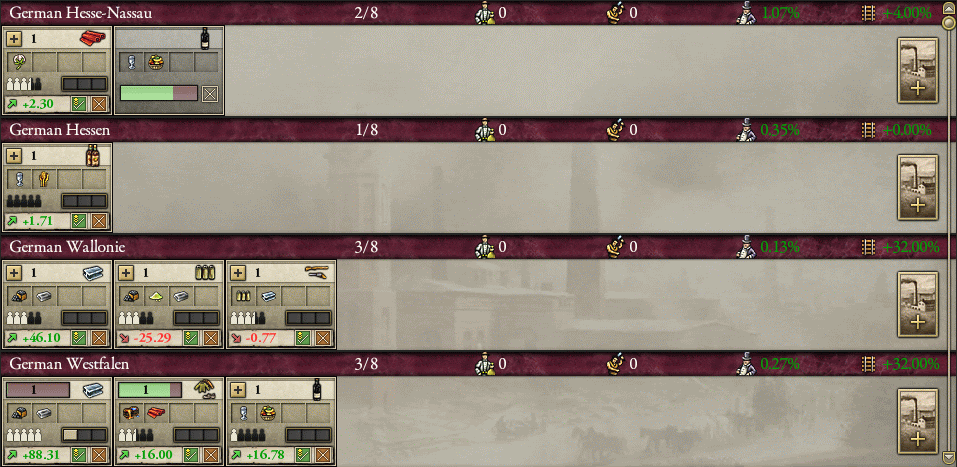
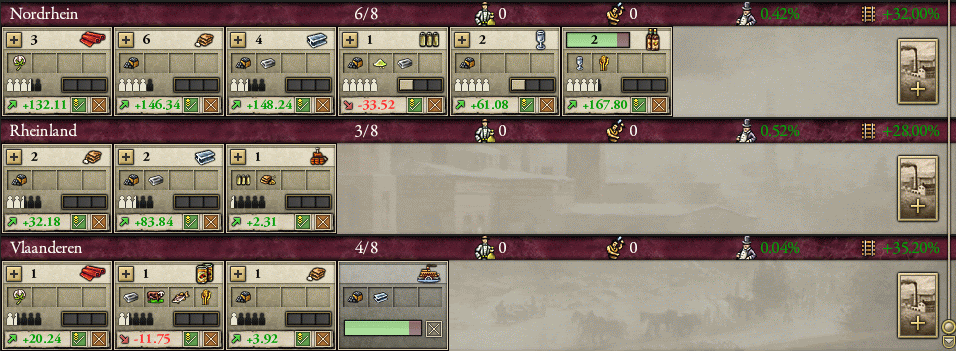
Whilst the past 5 years have seen significant growth outside of the Ruhr (most notably in Wallonia and the upper Rhineland) the lion’s share of both industry and industrial growth remains concentrated in the Rhineland.
Over the course of the past 5 years the Republic has successfully diversified beyond its specialisation in steel and cement to create booming textiles, arms and drinks industries. What’s more industry has been brought to previously largely rural areas in Hessen whilst Belgium has recovered strongly from total industrial collapse prior to the Republic’s invasions.

Ten years on from the revolution the world was still dominated by the great Imperialist powers. The traditional Imperial powers have retained their power (for the most part) and many have indeed expanded their influence. Meanwhile in the Americas three new Empires have emerged. In North America the Empire of Mexico recovered from the loss of Texas to the USA and secured victory in a civil war with its own people whilst in South America Brazil and Argentina have expanded their influence through sheer brute force. Whilst the ‘Republic’ of Argentina does not officially have a King the state does not bear the usual hallmarks of a Republic in that it does not have elections.

The United Kingdom has remained the undisputed greatest power on earth for 5 decades since Napoleon’s final defeat. Industrially it is unmatchable, its great fleet dwarfs all those of Europe’s other powers combined whilst its influence is felt in every single corner of the globe from New Zealand to Oregon.
Russia was the great success story of the mid 19th century. Under the leaderships of Nicholas I and Alexander II after him the Russian Empire has experienced an incredible wave of industrialisation. A mixture of forced migrations, a lack of land in the countryside and schemes by the state to encourage men to come to the cities provided millions of men as labour of Russia’s program of industrialisation (accomplished with British and French advisors). Whilst Russia’s industry is very simple in nature (this largely due to the lack of education in its workforce and a simple lack of expertise in the country) it is vast in scale. However with so much concentrated on industry the once vaunted Russian army has suffered. Already badly outdated by Nicholas’ ascension to the Imperial throne the army has not benefitted from any of the technological advances made elsewhere whilst it has failed to make up for this technological lag by increasing its size.
France has been a major loser of the past decades. Whilst still wielding the most powerful land army in Europe, perhaps the world, the Kingdom has lagged behind its main competitors (the UK and Russia) in other fields. Industrially it has failed to close the gap on the UK’s industrial lead whilst at the same time the Tsar’s Empire has outstripped France. More worrying for the state’s future is the clear internal divisions within the country which led to the ongoing French Civil War.
The USA experienced modest success during the mid 19th century. Benefitting from a steady flow of cheap labour from Europe the first Republic in the Americas has built up a strong if not entirely awe inspiring industrial base (largely located in the North of the country). However dreams of a Republic stretching from sea to shining sea have been dashed by Anglo-Russian influences in North America which have not only secured territories for those Empires but also continue to prop up the Mexican Empire as a counter to American ambition.
Amongst the Great Powers the VSVR is unremarkable. A cultural hotbed, if only for a niche, an industrial powerhouse, if only in the Ruhr, and a major military power, if only in Germany.
Austria has failed to modernise in the same way as the other great autocratic, multi-ethnic, Empire of Europe but has succeeded in many other areas. Industrial concentrations have sprouted up in Italy, Bohemia and along the Danube between Vienna and Budapest giving the Habsburg Empire a decent industrial base. Meanwhile its sphere of influence has, unlike Prussia’s, survived largely intact giving it the economic and military backing of its allies to make itself look perhaps artificially powerful. Realistically only France could defeat Austria in battle without a coalition of Great Powers forming.
Prussia is a state doing all it can to avert a decline that is being forced upon it by the unique power of the VSVR. With its sphere of influence in Northern Germany crumbling away and its industry being outpaced by all its major competitors Prussia, as always, has looked to its Army to hold itself up amongst the Great Powers. The Prussian Army still strikes fear into the hearts of Europe’s leaders.
Like Prussia the Ottoman Empire has been forced to fight against internal and external enemies to retain its place amongst the Great Powers. It has been much more successful at this than Prussia. In Thrace, Macedonia and Western Anatolia the Empire has created the seed of a strong industrial base. With industrial expansion comes modernisation and its military has slowly received the benefits of investment – now the Empire is slowly gobbling up the Levant despite the sometimes violent protests of the Great Powers.
VSVR Industry


Whilst the past 5 years have seen significant growth outside of the Ruhr (most notably in Wallonia and the upper Rhineland) the lion’s share of both industry and industrial growth remains concentrated in the Rhineland.
Over the course of the past 5 years the Republic has successfully diversified beyond its specialisation in steel and cement to create booming textiles, arms and drinks industries. What’s more industry has been brought to previously largely rural areas in Hessen whilst Belgium has recovered strongly from total industrial collapse prior to the Republic’s invasions.


